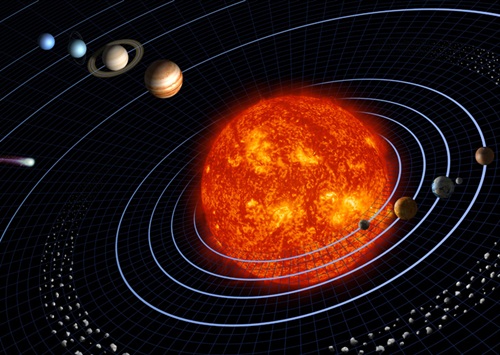Interesting things about the solar system
In the solar system, the hottest planet is not the closest to the Sun, Pluto is only half the size of America.
>> The solar system has a tail like a comet
>> Solar system fits in "bubble"
Explore the solar system and the planets of the solar system
1. Mercury is closest to the Sun, but the " hottest " planet is Venus
Venus has 100 times more dense atmosphere than Earth, with mostly CO2. The average temperature here is about 468 degrees Celsius, hot enough to melt tin and lead.
2 . Pluto is only about 2,200 km in diameter
This size is less than half the width of the United States and is much smaller than any other large planet. It is no longer considered a planet.
3. The only asteroid belt that scientists know exists between Mars and Jupiter
There are tens of thousands of asteroids flying in orbit between them, but far apart and very unlikely to collide. This is different from what we still see in fantasy movies, when spacecraft is always at risk of colliding with asteroids.

Solar System. (Photo: NASA / JPL)
4. Almost everything on Earth is a rare element
The basic composition of the Earth is mainly iron, oxygen, silicon, magnesium, sulfur, nickel, calcium, sodium and aluminum. However, when compared to the universe, they are just " microelements " because of the much richer abundance of hydrogen and helium in the universe.
5. Meteors have their roots in Mars
Chemical analysis of many meteorites found in Antarctica and the Sahara desert show that they originated from Mars . Larger meteorites, or certain collisions, can blow them to Earth.
6. Jupiter has the largest ocean of all planets
The planet is more than 5 times farther from the Sun than the Earth, composed primarily of hydrogen and helium. Hydro on Jupiter exists in liquid form, forming a 40,000 km deep " planet ocean ".
7. The Sun's outer atmosphere spreads at least 100 AU, nearly 16 billion km
The Sun's outer atmosphere extends far beyond its visible surface and Earth's orbit lies in this delicate atmosphere.
8. Many people believe that the new planet has natural satellites or Moon
The existence of a natural satellite, or the ability to control the gravity of a planet, is sometimes used as part of a true planet definition. However, in fact, Mercury and Venus do not have satellites, Mars has only very small satellites.
- 10 interesting things about life you may not know
- Discover many interesting things in the star closest to the solar system
- Discover the oldest solar system outside the solar system
- Video: 5 interesting facts about TRAPPIST-1
- The 10 most mysterious things in the Solar System (part 1)
- Interesting things about the planet
- 10 interesting things about nature you may not know
- Beautiful photo from the Solar System
- 10 interesting things about asteroids in the solar system
- Wild 2 dust comets reveal the amazing things about the solar system
- Explore the atmospheric atmospheres of the solar system
- Going from one surprise to the other is different from the interesting things about all things
 Van Allen's belt and evidence that the Apollo 11 mission to the Moon was myth
Van Allen's belt and evidence that the Apollo 11 mission to the Moon was myth The levels of civilization in the universe (Kardashev scale)
The levels of civilization in the universe (Kardashev scale) Today Mars, the sun and the Earth are aligned
Today Mars, the sun and the Earth are aligned The Amazon owner announced a secret plan to build a space base for thousands of people
The Amazon owner announced a secret plan to build a space base for thousands of people